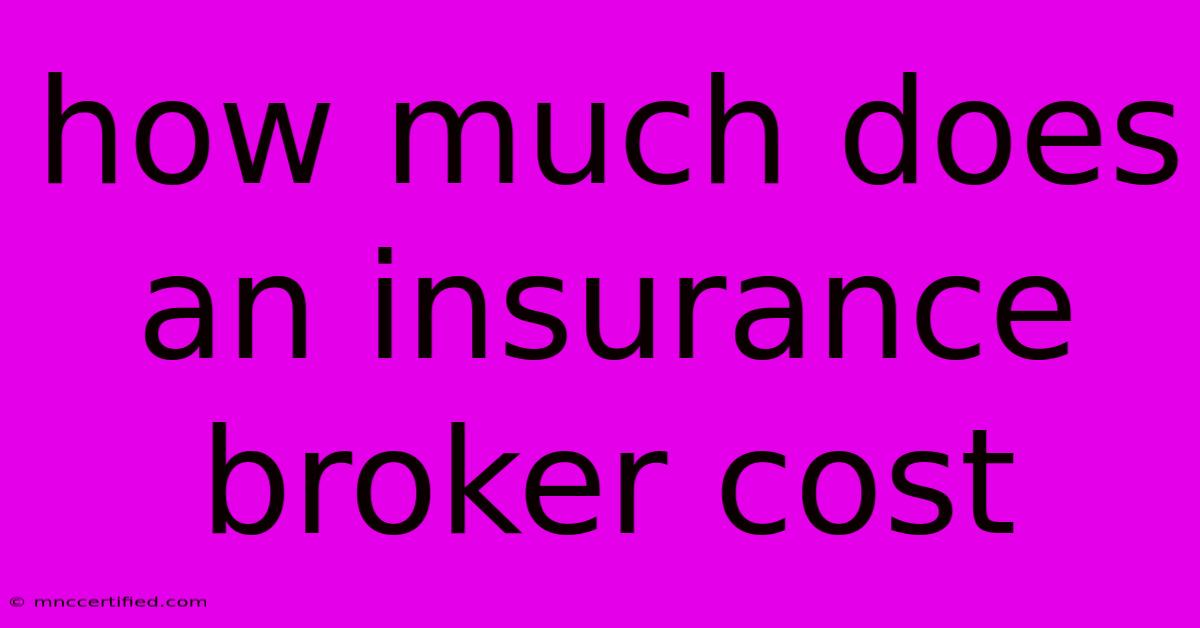How Much Does An Insurance Broker Cost

Table of Contents
How Much Does an Insurance Broker Cost? Understanding the Fees and Value
Finding the right insurance coverage can be a complex and time-consuming process. That's where insurance brokers come in – they act as your advocate, helping you navigate the insurance market and secure the best policies for your needs. But you might be wondering: how much does an insurance broker cost?
The answer, like most things related to insurance, is it depends. There's no one-size-fits-all answer, as the cost of using an insurance broker can vary based on several factors.
Understanding Broker Fees: A Breakdown
Here's a closer look at how insurance broker fees are typically structured:
- Commission: This is the most common way brokers are compensated. They earn a percentage of the premium you pay for your insurance policy. This percentage is typically negotiated between the broker and the insurance company. You generally don't pay this commission directly, as it's factored into your insurance premium.
- Hourly Rate: Some brokers charge an hourly rate for their services. This is particularly common for specialized brokers who provide in-depth consulting and complex risk management services.
- Flat Fee: Some brokers might offer a flat fee for their services, especially for specific services like policy reviews or insurance audits.
- Retainer Fee: Some brokers might require a retainer fee to secure their services. This fee ensures they're available to you for a specific period.
It's important to discuss the fee structure with your potential broker upfront. Ask them to explain their compensation model clearly so you know exactly what to expect.
The Value of an Insurance Broker: More than Just Cost
While the cost of an insurance broker might seem like a concern, it's crucial to consider the value they bring to the table.
Here are some key benefits of working with an insurance broker:
- Expert Advice: Brokers have extensive knowledge of the insurance market and can help you understand complex insurance policies and choose the best coverage options for your specific needs.
- Negotiation Power: Brokers can leverage their relationships with insurance companies to negotiate better rates and terms for you.
- Time Savings: They handle the entire insurance process, from finding quotes to negotiating with insurance companies.
- Advocacy: They're there to help you understand and manage your insurance claims.
Finding the Right Insurance Broker: A Few Tips
When searching for an insurance broker, here are a few tips to keep in mind:
- Get Recommendations: Ask friends, family, and colleagues for recommendations.
- Check Credentials: Ensure the broker is licensed and insured in your state.
- Request a Consultation: Schedule a free consultation with a few brokers to discuss your needs and their fee structure.
- Ask About Their Specialties: Choose a broker who specializes in the type of insurance you need (e.g., business insurance, health insurance, etc.).
Ultimately, the cost of an insurance broker is a small price to pay for the peace of mind and expertise they can provide. By understanding their fee structure and weighing their value, you can find an insurance broker who's a valuable partner in protecting your financial future.

Thank you for visiting our website wich cover about How Much Does An Insurance Broker Cost. We hope the information provided has been useful to you. Feel free to contact us if you have any questions or need further assistance. See you next time and dont miss to bookmark.
Featured Posts
-
What Led To The Raid At Alfie Oakes Estate
Nov 09, 2024
-
Mtn Laurel Associates Insurance Premium
Nov 09, 2024
-
Pet Shop Boys Release All The Young Dudes Cover
Nov 09, 2024
-
Early Childhood Investment Corporation
Nov 09, 2024
-
Chapter 13 And Life Insurance Proceeds
Nov 09, 2024